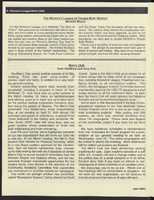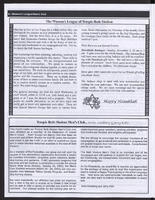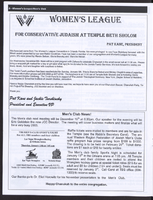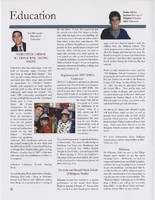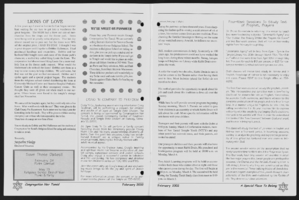Search the Special Collections and Archives Portal
Search Results

Transcript of interview with Judge Lee Koury by Claytee White, February 6, 2013
Date
Archival Collection
Description
Born in 1932 and raised in Los Angeles; mother was a housewife and later became a painter; mention of Olvera Street; Pio Pico first Mexican governor of California; Pico House; member of the Army; Deputy Sheriff; Mother Pauline Brown and father Lee Koury; Los Angeles County Sharon Tate; LaBiancas; Spahn Ranch; "the three girls on the comer" - Lynette Fromme, Sandra Good, and Nancy Pitman; Family - referring to the Manson case - Charles Mason, Robert Beausoleil, Susan Atkins, Steve Dennis Grogan, Patricia Kernwinkle, Mary Theresa Brunner, Bruce McGregor Davis, and Leslie VanHawten; Shorty Shay the person in charge at Spahn Ranch; mention of Polaroids mailed to prisoners that ended up being an important part of the Manson case.
Text
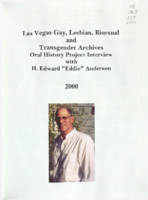
Transcript of interview with Edward "Eddie" Anderson by Dennis McBride, October 11-14, 2000
Date
Archival Collection
Description
Dennis McBride interviews Eddie Anderson (born 1946) about his role in advocating for LGBT rights, specifically his participation in the various political and social movements during previous decades. The interview begins with a discussion of Anderson’s background, including his experiences growing up in children’s homes and living with his grandparents. Anderson mentions marching with his grandparents for both workers’ and women’s rights as some of his first political involvements. Anderson also discusses his original aspirations for becoming a priest as well as his memories of meeting President John F. Kennedy during a visit to his high school when Anderson was student body president. Anderson then discusses travelling to the South, specifically in Selma, Alabama, during one summer while in high school in order to help register Black voters. Anderson then discusses his friendship with Nevada Senator Bill Raggio and his wife, and his joining of the U.S. Navy, where he met President Ri
Text

Transcript of interview with Charlotte Hill by Clattee D. White, May 4, 2009
Date
Archival Collection
Description
Charlotte Hill's arrival in Las Vegas was not an instant love affair. She had grown up in Cincinnati, Ohio, and in comparison Las Vegas "was the worst place I had ever been." The year was 1952. He husband had taken a job with the Sands casino. Over the next six decades Charlotte would become an honored volunteer and community activist. Her first organization was the Brownies as a mother and soon was involved with the Frontier Girl Scout Council, about which she shares a delightful story about cookie sales. In 1962, she was a charter member of the Home of the Good Shepherd. In 1972, she founded the Friends of Channel 10 and became innovative and active in fundraising for public broadcasting. By 1974, she was the United Way's first woman campaign chairperson, a quite successful one who helped exceed the one-million dollar goal during economically difficult times. Her other milestones included serving on Economic Opportunity Board, board of Boys and Girls Clubs of Las Vegas, as president of the Community College of southern Nevada Foundation and most recently being named to the Nevada State Board of Education. Charlotte's community efforts have made a difference in countless people's lives. She has been acknowledged numerous times, but counts the Alexis de Tocqueville Award from United Way of America as a crowning achievement. In addition to her volunteer work, she is a fashion consultant with the Carlisle Collection.
Text

Transcript of interview with Christopher Maestas by Claytee White, September 14, 2008
Date
Archival Collection
Description
Christopher “Chris” Maestas (1965-2009) was an engaged educator and leader within the Chicano, Latinx, and Henderson communities. As he traced back his Latinx heritage, he explored his father’s hometown in Llaves, New Mexico, where he and his family were discriminated for their non-white demeanor; and his mother’s paternal Spanish roots; his grandfather came to work in Henderson, Nevada at the Basic Magnesium Industrial (BMI) plants during World War II. The Chicano and Spanish cultures played a significant part in defining his role within the community. For Chris, Chicanos were “people that lived in the southwestern United States particularly southern Colorado, New Mexico and northern Arizona that were originally Mexican citizens before the treaty (Treaty of Guadalupe Hidalgo) was signed and then after the treaty was signed they became Americans.” In this interview, he dives into the difference between Chicano and Spanish cuisine and gives his own tips on how to make Spanish chile relleno. Chris discussed what life was like in Henderson living in Henderson Camp when his grandfather emigrated from Spain in 1943. He described the evolution of the Henderson community in the 50s through his parents’ experiences living in the Hispanic communities of Victory Village and Carver Park. During his childhood in the early 70s, Chris recalled living in Henderson when it was known as Basic and living in a small town-site house. One of his most special recollections was from the summer of 1980, when his family purchased their first set of air-conditioning units. As a passionate teacher and 1984 alumnus from Basic High School, he advocated student engagement as Student Council Advisor. Chris was also an active member of the St. Peter the Apostle, Catholic Church, Knights of the Columbus group and LUPE (Latinos United for Perfect Equality) Club. The LUPE club promoted equality for the Hispanic community and family values. Chris described their Saturday picnics at BMI Park and the annual Henderson Industrial Days festival.
Text

Interview with John Frederick Campbell, July 23, 2004
Date
Archival Collection
Description
Text

